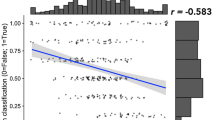Abstract
Building on the work of Sproule, Fahnestock and Secor, and Kruger, we present a specific typology of statements. In particular, we distinguish broadly logically determinate statements, descriptions, interpretations, and evaluations. We generate this typology through a series of dichotomous divisions of statements. We divide statements first into the broadly logically determinate versus contingent, the contingent into the evaluational versus natural, and the natural into the extensional versus intensional. We show that the rationales for these distinctions are well motivated and philosophically important. In particular, we argue that identifying the type of a statement is relevant to showing whether or not the sources vouching for it render the statement epistemically acceptable.
Similar content being viewed by others
REFERENCES
Beardsley, Monroe C.: 1975, Thinking Straight: Principles of Reasoning for Readers and Writers, fourth edition, Prentice-Hall, Englewood Cliffs, NJ.
Burks, Arthur W.: 1951, ‘The Logic of Causal Propositions’, Mind 60, 363–382.
Eemeren, Frans H. van and Rob Grootendorst: 1992, Argumentation, Communication, and Fallacies: A Pragma-Dialectical Perspective, Lawrence Erlbaum Associates, Publishers, Hillsdale, NJ.
Fahnestock, Jeanne and Marie Secor: 1982, A Rhetoric of Argument, Random House, New York.
Freeman, James B.: 1991, ‘A Dialectical Approach to Statement Acceptability’, in Frans H. van Eemeren, Rob Grootendorst, J. Anthony Blair and Charles A. Willard (eds.), Proceedings of the Second International Conference on Argumentation, SICSAT, Amsterdam, pp. 338–347.
Freeman, James B.: Warrant, Presumption, Acceptability, in preparation.
Kruger, Arthur N.: 1975, ‘The Nature of Controversial Statements’, Philosophy and Rhetoric 8, 137–158.
Moore, Brooke Noel and Parker, Richard: 1986, Critical Thinking: Evaluating Claims and Arguments in Everyday Life, Mayfield Publishing Company, Palo Alto, CA.
Moore, George Edward: 1903, Principia Ethica, Cambridge University Press, Cambridge.
Nagel, Ernest: 1961, The Structure of Science: Problems in the Logic of Scientific Explanation, Harcourt, Brace & World, Inc., New York.
Perelman, Ch. and L. Olbrechts-Tyteca: 1969, The New Rhetoric: A Treatise on Argumentation, University of Notre Dame Press, Notre Dame.
Plantinga, Alvin: 1993, Warrant and Proper Function, Oxford University Press, New York.
Quine, W. V.: 1970, Philosophy of Logic, Prentice-Hall, Inc., Englewood Cliffs, NJ.
Reid, Thomas: 1983, Thomas Reid's Inquiry and Essays, ed. Ronald E. Beanblossom and Keith Lehrer, Hackett Publishing Company, Inc., Indianapolis.
Secor, Marie: 1998, ‘Reply to Freeman's, in Hans V. Hanson, Christopher W. Tindalo, and Athena V. Coleman (eds.), Argumentation and Rhetoric, CD-Rom/OSSA, St. Catharine, Ontario.
Sproule, J. Michael: 1980, Argument: Language and Its Influence, McGraw-Hill Book Company, New York.
Weitz, Morris: 1967, ‘Philosophical Analysis’, The Encyclopedia of Philosophy, Macmillan Publishing Co., Inc. and The Free Press, New York, Vol. 1, pp. 97–105.
Author information
Authors and Affiliations
Rights and permissions
About this article
Cite this article
Freeman, J.B. What Types of Statements are There?. Argumentation 14, 135–157 (2000). https://doi.org/10.1023/A:1007846431353
Issue Date:
DOI: https://doi.org/10.1023/A:1007846431353




